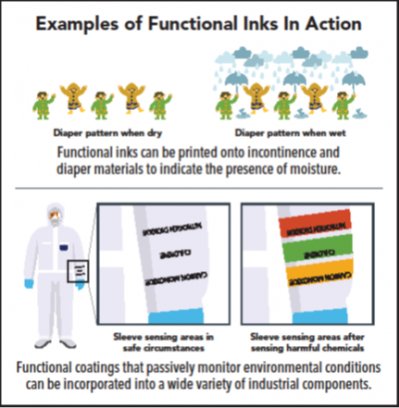
DSM’s carbon fibre filament for 3D printing
Capability is designed for personal care applications such as incontinence wear and diapers

9th March 2020
Innovation in Textiles
|
Marlborough, MA
“Functional ink refers to printed coatings that register a change when exposed to reagents such as moisture. The change could involve fading or becoming a different colour, releasing a tell-tale odour or triggering an increase or decrease in temperature,” the company said I a statement. Web Industries’ Fort Wayne, Ind., printing facility can apply functional ink coatings to a variety of materials on behalf of manufacturing customers.
“Functional ink is all about providing information to product users,” says Business Development Manager Courtney Robinson. “Garments or materials printed with functional ink indicate changes and can prompt corrective actions. Personal care product manufacturers, for example, can employ functional inks to indicate the status of incontinence wear, where the ink will fade or alter colour when exposed to moisture, alerting caregivers to change the garment.”
Industrial applications
Functional ink coatings also have a wide range of industrial uses, according to Web. “The ability to build chemical or bio-reactive markers directly into personal protective equipment or other product components can provide an added level of awareness and safety for first responders and other users,” Robinson commented. “For instance, a tailored coating could be applied to specific areas of single-use hazmat suits that would change colour to indicate the presence of specific levels of a contaminant. By providing passive monitoring during an emergency situation, these ‘sensing areas’ would allow the wearer to focus on their specific task while knowing that their exposure to harmful chemicals or bio-agents was being assessed.”
“Another high-potential use is in industrial control systems,” Robinson said. “For instance, an electrically-conductive functional coating could be applied to a substrate that breaks down in the presence of excessive heat. Used as a sensor component, an overheating condition would cause the material to degrade, breaking the electrical connection and signalling the equipment’s PLC/computer.”

Business intelligence for the fibre, textiles and apparel industries: technologies, innovations, markets, investments, trade policy, sourcing, strategy...
Find out more